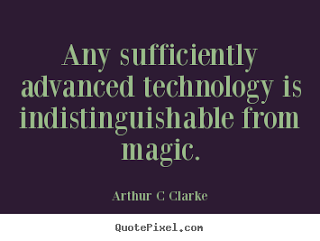Is "Modern Medicine" Indistinguishable From Magic?

One of the late Arthur C. Clarke's great (and often cited) quotes:
Evidently, most of health care's technologies are not yet sufficiently advanced.
For example, just think about chemotherapy. We've spent lots of money developing ever more powerful, always more expensive, hopefully more precise drugs to combat cancers. In many cases they've helped improve cancer patients' lifespans -- adding months or even years of life. But few who take them would say the drugs are without noticeable side effects -- e.g., patients often suffer nausea, vomiting, hair loss, fatigue, appetite loss, sexual issues, or a mental fog that is literally called "chemo brain."
No, when you are having chemo -- or radiation, or surgeries to remove tumors -- you'll know your treatment isn't magic.
We've gotten better about some of our treatments. Getting cataract surgery is light years ahead of what it used to be, allowing the procedure to be done on an ambulatory basis instead of requiring extended hospital stays. Similarly, laparoscopic surgery allows for much smaller incisions, smaller resulting scars, and shorter recoveries.
Antibiotics seemed like magic when we first started using them, and use them we did. They allowed millions of people to survive infections that might have previously killed them, and helped more millions to get better faster from others. But we've painfully learned that they are not without consequence. Taking them as prolifically as we have led to antibiotic resistance, to the point the UN has declared it a crisis. Equally as bad, we've belated realized the havoc that they have on our microbiome, causing a yet-unknown wide scope of adverse health outcomes.
If antibiotics are magic, they are the kind of magic that is of the "be careful what you wish for" variety.
But, in both cases, you'll still know you had surgery -- before, during, and after it. reflectionsipc.comIn some sense, we've built our health care system this way, which is why it is actually a medical care system. We increasingly don't think we can get well until and unless we see a physician, and he/she does something. It often seems as though it doesn't really matter what they do -- the infamous placebo or care effect -- as long as a physician does something to us.
reflectionsipc.comIn some sense, we've built our health care system this way, which is why it is actually a medical care system. We increasingly don't think we can get well until and unless we see a physician, and he/she does something. It often seems as though it doesn't really matter what they do -- the infamous placebo or care effect -- as long as a physician does something to us.
It also helps explain why we put up with a number of at best unpleasant, at worst harmful tests and procedures. It is as if we believe that the more we suffer from our treatments, the more likely it is that they will be successful. Many primitive cultures might recognize this principle.
We should be aiming higher. This is the 21st century, after all. We should be aiming for interventions that are, well, indistinguishable from magic.
We've done a poor job of taking into account cost-effectiveness in medical treatments. Outrage over prescription drug price hikes and concern about the ballooning costs of new cancer drugs have helped us be more aware of the problem, but cost-effectiveness is not the only issue. A new study in JAMA Internal Medicine found many new cancer drugs not only didn't extend patients' lives but also that their impact on patients' quality of life wasn't even evaluated.
Pretty much, as long as a new drug, device, or treatment can demonstrate that it provides some clinical value, we seem to end up using it, even if it is vastly more expensive and/or produces no better outcomes than existing options. Even if we as patients suffer more from the process of getting or using it.
This has to change.
We need to look at how much things cost to make us better, how much better they actually make us, and whether they make better the process of getting better.
A couple examples illustrate the kind of interventions that more closely fit the goal of delivering some magic:
- Gene editing: Recent advances in a technology called CRISPR-Cas 9 has allowed the field of gene editing to advance several years. It can snip out defective genes and, potentially, replace them with "correct" versions. Instead of treating a condition or disease, gene editing could eliminate the precursors that cause or allow them to develop,
- Nanobots: Nanotechnology has been on health care's radar screen for many years now, but the supporting technology is finally starting to make it more of a reality. Simply inject nanobots into a patient's bloodstream and it might deliver targeted drugs, destroy cancer cells, repair tissue damage, clear clots, and so on. Like our immune systems, the nanobots could wage a never-ending war against things that might cause us harm.
This may come as a blow to medical professionals, but we don't really care about medical care. We care about our health, and about being healthy. We may have grown accustomed to needing medical professionals and medical treatments to try to achieve that goal. but it's like the old adage about sausage-making: we don't really want to see (or be part of!) the process.
A few months ago Martin Legowiecki wrote in TechCrunch that "the ultimate UI is no UI." It should be "invisible" to users. It should be the same for health care; we should seek to have care be invisible.
Health care innovators, don't settle for good, or even better. Shoot for magic.
| Indistinguishable From Magic was authored by Kim Bellard and first published in his blog, From a Different Perspective.... It is reprinted by Open Health News with permission from the author. The original post can be found here. |
- Tags:
- 3D bioprinting for organs or tissues
- Antibiotics
- Arthur C. Clarke
- cataract surgery
- chemotherapy
- cost-effectiveness in medical treatments
- CRISPR-Cas 9
- gene editing
- health care innovation
- JAMA Internal Medicine
- Kim Bellard
- laparoscopic surgery
- Martin Legowiecki
- nanobots
- nanotechnology
- organic electronics
- precise drugs to combat cancers
- prescription drug price hikes
- radiation
- surgeries
- United Nations (UN)
- virtual reality (VR)
- Login to post comments